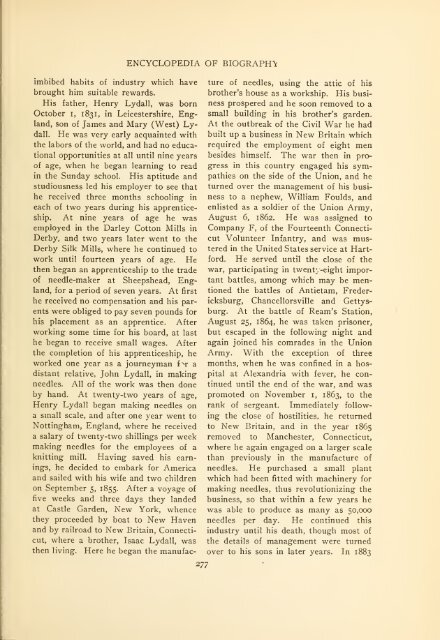Encyclopedia of Connecticut biography, genealogical-memorial ...
Encyclopedia of Connecticut biography, genealogical-memorial ...
Encyclopedia of Connecticut biography, genealogical-memorial ...
Create successful ePaper yourself
Turn your PDF publications into a flip-book with our unique Google optimized e-Paper software.
imbibed habits <strong>of</strong> industry which have<br />
brought him suitable rewards.<br />
His father, Henry Lydall, was born<br />
October i, 1831, in Leicestershire, England,<br />
son <strong>of</strong> James and Mary (West) Lydall.<br />
He was very early acquainted with<br />
the labors <strong>of</strong> the world, and had no educa-<br />
tional opportunities at all until nine years<br />
<strong>of</strong> age, when he began learning to read<br />
in the Sunday school. His aptitude and<br />
studiousness led his employer to see that<br />
he received three months schooling in<br />
each <strong>of</strong> two years during his apprenticeship.<br />
At nine years <strong>of</strong> age he was<br />
employed in the Darley Cotton Mills in<br />
Derby, and two years later went to the<br />
Derby Silk Mills, where he continued to<br />
work until fourteen years <strong>of</strong> age. He<br />
then began an apprenticeship to the trade<br />
<strong>of</strong> needle-maker at Sheepshead, Eng-<br />
land, for a period <strong>of</strong> seven years. At first<br />
he received no compensation and his par-<br />
ents were obliged to pay seven pounds for<br />
his placement as an apprentice. After<br />
working some time for his board, at last<br />
he began to receive small wages. After<br />
the completion <strong>of</strong> his apprenticeship, he<br />
worked one year as a journeyman hra<br />
distant relative, John Lydall, in making<br />
needles. All <strong>of</strong> the work was then done<br />
by hand. At twenty-two years <strong>of</strong> age,<br />
Henry Lydall began making needles on<br />
a small scale, and after one year went to<br />
Nottingham, England, where he received<br />
a salary <strong>of</strong> twenty-two shillings per week<br />
making needles for the employees <strong>of</strong> a<br />
knitting mill. Having saved his earnings,<br />
he decided to embark for America<br />
and sailed with his wife and two children<br />
on September 5, 1855. After a voyage <strong>of</strong><br />
five weeks and three days they landed<br />
at Castle Garden, New York, whence<br />
they proceeded by boat to New Haven<br />
and by railroad to New Britain, <strong>Connecticut</strong>,<br />
where a brother, Isaac Lydall, was<br />
then living. Here he began the manufac-<br />
ENCYCLOPEDIA OF BIOGRAPHY<br />
277<br />
ture <strong>of</strong> needles, using the attic <strong>of</strong> his<br />
brother's house as a workship. His busi-<br />
ness prospered and he soon removed to a<br />
small building in his brother's garden.<br />
At the outbreak <strong>of</strong> the Civil War he had<br />
built up a business in New Britain which<br />
required the employment <strong>of</strong> eight men<br />
besides himself. The war then in progress<br />
in this country engaged his sympathies<br />
on the side <strong>of</strong> the Union, and he<br />
turned over the management <strong>of</strong> his business<br />
to a nephew, William Foulds, and<br />
enlisted as a soldier <strong>of</strong> the Union Army,<br />
August 6, 1862. He was assigned to<br />
Company F, <strong>of</strong> the Fourteenth <strong>Connecticut</strong><br />
Volunteer Infantry, and was mustered<br />
in the United States service at Hart-<br />
ford. He served until the close <strong>of</strong> the<br />
war, participating in twenty-eight important<br />
battles, among which may be men-<br />
tioned the battles <strong>of</strong> Antietam, Freder-<br />
icksburg, Chancellorsville and GettyS"<br />
burg. At the battle <strong>of</strong> Ream's Station,<br />
August 25, 1864, he was taken prisoner,<br />
but escaped in the following night and<br />
again joined his comrades in the Union<br />
Army. With the exception <strong>of</strong> three<br />
months, when he was confined in a hos-<br />
pital at Alexandria with fever, he continued<br />
until the end <strong>of</strong> the war, and was<br />
promoted on November 1, 1863, to the<br />
rank <strong>of</strong> sergeant. Immediately follow-<br />
ing the close <strong>of</strong> hostilities, he returned<br />
to New Britain, and in the year 1865<br />
removed to Manchester, <strong>Connecticut</strong>,<br />
where he again engaged on a larger scale<br />
than previously in the manufacture <strong>of</strong><br />
needles. He purchased a small plant<br />
which had been fitted with machinery for<br />
making needles, thus revolutionizing the<br />
business, so that within a few years he<br />
was able to produce as many as 50,000<br />
needles per day. He continued this<br />
industry until his death, though most <strong>of</strong><br />
the details <strong>of</strong> management were turned<br />
over to his sons in later years. In 1883

















